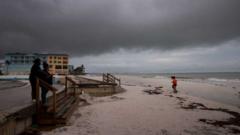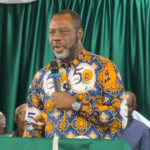Florida residents are rushing to finish emergency preparations – or just leave – as Hurricane Milton races toward landfall on the heavily-populated Tampa Bay.
Milton is currently a category five storm, packing ferocious winds of up to 165mph (270km/h). It is expected to hit with full force on Wednesday night, less than two weeks after the state was struck by the devastating Hurricane Helene.
President Joe Biden warned people in Florida on Tuesday to leave their homes as a “matter of life and death” while the state undertakes its largest evacuation effort in years.
“A category five, that is like a giant tornado coming at you,” one resident of the Gulf Coast city of Bradenton told the BBC from the hotel that he has evacuated to in Kissimmee.
“I wouldn’t want to be there,” said Gerald Lemus. “This will be a life-changing storm no matter where it hits.”
Mr Lemus, who has lived in Bradenton his entire life, said he has never evacuated for any previous storm. But he decided he has to for the safety of his eight-year-old daughter.
“I just looked at her and I couldn’t traumatise her to something like this,” he said on Tuesday night. “It’s a gamble we weren’t willing to make.”
ML Ferguson has been struggling to rebuild her home in Anna Maria, Florida, after it was severely damaged last month by Helene, a powerful category four hurricane when it hit.
“This one is going to be way worse than Helene,” she said on the phone while stalled in highway traffic out of the city.
“My car is totalled, we all were laid off of our job, and [my] belongings were ruined. After this storm hits, I will officially become homeless.”
Governor Ron DeSantis said on Tuesday that Florida had prepared dozens of shelters outside of evacuation zones to help house residents left stranded in the wake of the “monster” storm.
Long queues at petrol stations formed in south Florida, as some stations began running out of fuel.
Chynna Perkins told the BBC she is remaining in Tampa, where she lives in a newly constructed home outside the mandatory evacuation zones.
“I don’t think people really understand how much planning has to go into a decision like this,” she said, adding that she has two large Great Danes.
“There’s so much traffic and barely any gas available right now. People are running out of gas on the highway.”
DeSantis said that petrol was being trucked to stations, and electric vehicle charging stations also were deployed along roadways to ease the evacuation.
Tampa resident Steve Crist, spoke to the BBC while boarding up the windows of his dentist office. “Everyone’s gone. I’ve never seen it so quiet,” he said.
Speaking at the White House on Tuesday, President Biden said the storm could be one of Florida’s worst in a century.
“Evacuate now, now, now,” he told Florida residents.
The White House cancelled Biden’s planned visit to Germany and Angola in order to oversee preparations for Milton and ongoing recovery from Hurricane Helene.
Less than two weeks ago Hurricane Helene – the deadliest mainland storm since Katrina in 2005 – pummelled the US south-east, killing at least 225. Hundreds more are missing.
At least 14 of those deaths were in Florida, where 51 of 67 counties are now under emergency warnings as Milton approaches.
The National Hurricane Center has warned people to brace for strong winds that could potentially send debris still on the streets from Helene to destructively fly through the air.
Rainfall totals could reach highs of 15in (38cm), and coastal areas could see storm surges of 10-15ft (3-4.5m).
Hurricanes are categorize based on wind speed. Category three and higher are considered major because of their potential for damage and loss of life, according to the National Weather Service.
Counties began issuing evacuation orders on Monday, with tolls suspended on roads in western and central Florida.
School closures in several counties began on Tuesday. Airports in Tampa and Orlando announced they would be suspending flight operations until the storm passes.
Parts of Pinellas County, where at least a dozen people were killed by Helene, were placed under evacuation orders on Monday.
The approach of the new hurricane comes as the US government warns that clean-up efforts could take years after Hurricane Helene.
Over 12,000 cubic yards of debris have been removed in Helene-affected areas of Florida in less than two days, officials said.
Hundreds of roads remain closed, hampering efforts to send aid to hard-hit communities.
As well as in Florida, deaths were recorded in Georgia, South Carolina, Tennessee and Virginia – and the worst-hit state, North Carolina.
Biden has ordered another 500 soldiers to be deployed to North Carolina. The troops – who now number 1,500 in all – will work with thousands of government relief workers and National Guard.
He has so far approved nearly $140m (£107m) in federal assistance.
Sign up for our Future Earth newsletter to get exclusive insight on the latest climate and environment news from the BBC’s Climate Editor Justin Rowlatt, delivered to your inbox every week. Outside the UK? Sign up to our international newsletter here.
















